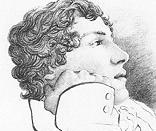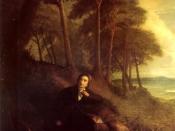"THE EXCESS IN KEATS' WORK DETRACTS FROM THE EFFECTIVENESS OF HIS IDEAS. DO YOU AGREE?"
John Keats was a Romantic poet of the 19th century. As a 'Romantic', his desire was, through his poetry, to convey a vision that encompassed all experiences good and bad, transient and eternal. He believed his work should not be read as a quiet pastime, but instead, indulged in as an experience of such intensity, that the reader imagined his words as memories and feelings of their own. Keats wanted those who read his work to feel what he felt, see what he saw and hear music in the words he wrote. It is through his use of vivid imagery and rich descriptions that Keats draws us into his world of imagination and thereby achieves his goal, as we join him in his experiences. Without this use of excess, we would be unable to full appreciate the ideas he wished to convey.
'We read fine things but never feel them to the full until we have gone the same steps as the author', Keats' letter to John Hamilton Reynolds, 3rd May, 1818.
Keats' belief that the reader should be a participant in, rather than a spectator of his poetry, meant that he incorporated excess into the language, imagery and techniques he used, in a bid to achieve this.
The effect of the excess in his language, is that the reader is left with an image so powerful, that it evokes emotions which normally would only have been possible if the reader had physically experienced those events themselves. It was this use of language that led to some of the criticism from those around him. In a letter to John Murray on the 18th November, 1820, Lord Byron, an Augustan poet, whose concepts were related to...



Very nice
Very nice, Keats is a favorite of mine and you really did a nice job.
1 out of 2 people found this comment useful.